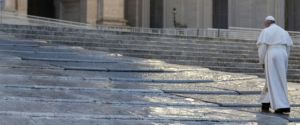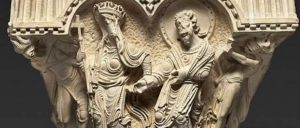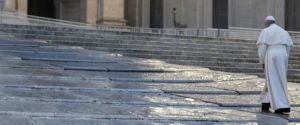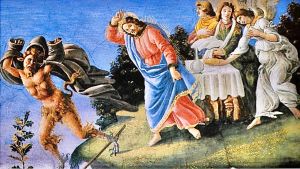
don Giuseppe Nespeca
Giuseppe Nespeca è architetto e sacerdote. Cultore della Sacra scrittura è autore della raccolta "Due Fuochi due Vie - Religione e Fede, Vangeli e Tao"; coautore del libro "Dialogo e Solstizio".
Lenten Spirituality, and the enemy who seems a friend
Faith, Temptations: our success
(Mt 4:1-11; Mk 1:12-15; Lk 4:1-13)
Only the man of God is tempted.
In the Bible, temptation is not a kind of danger or seduction to death, but an opportunity for life. Even more: a revival from the usual entanglements.
Optics of Lenten Spirituality:
Every day we verify that a relevant pitfall for the experience of Faith seems to be 'luck'. It binds us to the immediate good of individual situations.
Vice versa, on the other hand, makes routine: here is well-being, escaping from failures and unhappy events, the stasis of the same-as-before.
A devout person can even use religion to sacralise his or her coarse world, bound by habits (considered stable).
So - according to circumstance - even willingly enter into the practice of the sacraments, as long as they remain parentheses that do not mean much.
When existence runs smoothly, here instead is the earthquake of flattery... a challenge that throws one back into the balance.
In God's plan, the test of Faith does not come to destroy minds and existence, but to disturb the swampy reality of obligations contracted in the quiet of conformist etiquette.
In fact, in labels we are not ourselves, but a role: here it is impossible to truly conform to Christ.
Every peril comes for a salutary jolt even of image, and to shake us up.
The Exodus encourages us to take a leap forward - not to drown our existence in the anthology of uncritical mechanisms under conditions, and to submit to the influence of recognised cords; 'useful', but diverting our naturalness.
The passage is narrow and even forced; it wounds. But it spurs us on to meet ourselves, our brothers, and the world again.
Providence presses on: it is educating us to look in the face both every detail and the fundamental option.
We do not grow or mature by settling our souls on everyone's opinions and sitting in majority, habitual, 'respectable', supposedly truthful situations. Yet not very spontaneous, lacking transparency and reciprocity with our founding Eros.
Nor do we become adults by embracing ascetic athleticism, or easier shortcuts of mass, class, cliques, or herd - which make us outsiders.
To emerge from dangers, seductions, disturbances, we are obliged to look within and bring out all resources, even those unknown or to which we have not given credit.
Difficulties and crises force us to find solutions, to give space to the neglected, shadowed sides; to see well and ask for help; to inform ourselves, to enter into a qualitative relationship, and to confront ourselves from within.
Of necessity, virtue: after the attraction and the enticement or the trial, the renewed and reaffirmed point of view from a new evaluation questions the soul about the calibre of choices - about our own infirmities.
They themselves have something to tell us: they come from the deepest layers of being, which we must encounter - in order not to remain disassociated. And they take the form of mouldable energies, then to be invested in.
The calls to revolutionise views of self and of things - the vocations to a new birth - are not incitements to annihilate one's world of relationships, or spurs to the worst, nor spiritual humiliation.
The 'crosses' and even the blunders are a territory of labour pains that guide one to intimate contact with our Source - which from time to time re-awakens us with new genesis, with different births.
The man who always listens to his own centre and remains faithful to the singular dignity and uniqueness of Mission, must however withstand the pressures of an evil that only instigates death.
Mt and Lk describe such seemingly friendly allurements, i.e. for success, in three symbolic pictures:
Here is the relationship with things [stones into bread]; with others [temptation of kingdoms]; with God [on Trust in the Father's Action].
Stones into bread: the Lord's own life tells us that it is better to be defeated than to be well off.
The elusive way - even pious, inert, without direct contact - of relating to material realities is under indictment.
The person, even religious but empty, merely gives or receives directions, or allures with special effects.
He makes use of prestige and his own qualities and titles, almost as if to escape the difficulties that may bother him, involve him at root.
In contrast, the person of Faith is not only empathetic and supportive in form, but fraternal and authentic.
He does not keep a safe distance from problems, nor from what he does not know; he takes Exodus seriously. Paying it.
He feels the impulse to walk the hard path side by side with himself (in deep truth) and with others, without calculation or privilege.
Nor does it deploy resources solely in its own favour - by detaching and retreating, or by making do; by blundering, by conforming to the club of conformists from the relaxation zone and fake security.
Temptation of kingdoms. Our] counterpart is not exaggerating (Mt 4:9; Lk 4:6): the logic that governs the idolatrous kingdom has nothing to do with God.
To take, to ascend, to command; to grasp, to appear, to subjugate: these are the worst ways of dealing with others, who seem to be there only for utility, and to be stools, or to annoy us.
The lust for power is so irrepressible, so capable of seduction, that it seems to be a specific attribute of the divine condition: to be on high.
Although he could get ahead, Jesus did not want to confuse us by leading, but by shortening the distance.
In history, unfortunately, several churchmen have been unclear. They have willingly exchanged the apron of service and the towel of our feet for the torn chair and a coveted office.
Puppet idols not to be worshipped.
The final temptation - the culmination of the Temple's 'guarantee of protection' - seems like the others a trivial piece of advice in our favour. Even for 'success' in our relationship with God - after that with things and people.
But what is at stake here is full Trust in the Father's Action. He imparts life, ceaselessly strengthening and expanding our being.
Even in the opportunities that seem less appealing, the Creator ceaselessly generates opportunities for more genuine wholeness and fulfilment, which, reworked without hysteria, accentuate the wave of life.
He increasingly presses for the canons to be crossed. And the creaturely being transpires. Therein lurks a secret, a Mystery, a destination.
His is a thrust far from being planted on the spectacle-miracle, or on sacred assurance [which then shies away from unwelcome insights and risky risks].
A curious fact emerges in the Holy Scriptures: spiritually sluggish people are never tempted! And the reverse is also true.
It is the way of living and internalising the lightning or the time of Temptation that distinguishes Faith from the banality of any devotion.
Spiritual journey: why?
Dear Brothers and Sisters,
This is the First Sunday of Lent, the liturgical Season of 40 days which constitutes a spiritual journey in the Church of preparation for Easter. Essentially it is a matter of following Jesus who is walking with determination towards the Cross, the culmination of his mission of salvation. If we ask ourselves: “Why Lent? Why the Cross?”, the answer in radical terms is this: because evil exists, indeed sin, which according to the Scriptures is the profound cause of all evil. However this affirmation is far from being taken for granted and the very word “sin” is not accepted by many because it implies a religious vision of the world and of the human being.
In fact it is true: if God is eliminated from the world’s horizon, one cannot speak of sin. As when the sun is hidden, shadows disappear. Shadows only appear if the sun is out; hence the eclipse of God necessarily entails the eclipse of sin. Therefore the sense of sin — which is something different from the “sense of guilt” as psychology understands it — is acquired by rediscovering the sense of God. This is expressed by the Miserere Psalm, attributed to King David on the occasion of his double sin of adultery and homicide: “Against you”, David says, addressing God, “against you only have I sinned” (Ps 51(50):6).
In the face of moral evil God’s attitude is to oppose sin and to save the sinner. God does not tolerate evil because he is Love, Justice and Fidelity; and for this very reason he does not desire the death of the sinner but wants the sinner to convert and to live. To save humanity God intervenes: we see him throughout the history of the Jewish people, beginning with the liberation from Egypt. God is determined to deliver his children from slavery in order to lead them to freedom. And the most serious and profound slavery is precisely that of sin.
For this reason God sent his Son into the world: to set men and women free from the domination of Satan, “the origin and cause of every sin”. God sent him in our mortal flesh so that he might become a victim of expiation, dying for us on the Cross. The Devil opposed this definitive and universal plan of salvation with all his might, as is shown in particular in the Gospel of the temptation of Jesus in the wilderness which is proclaimed every year on the First Sunday of Lent. In fact, entering this liturgical season means continuously taking Christ’s side against sin, facing — both as individuals and as Church — the spiritual fight against the spirit of evil each time (Ash Wednesday, Opening Prayer).
Let us therefore invoke the maternal help of Mary Most Holy for the Lenten journey that has just begun, so that it may be rich in fruits of conversion.
[Pope Benedict, Angelus, 13 March 2011]
May the Millennium
I am with you always, to the close of the age (Mt 28:20)
Dear Brothers and Sisters,
1. This year, the celebration of Lent, a time of conversion and reconciliation, takes on a particular character, occurring as it does during the Great Jubilee of the Year 2000. The time of Lent is in fact the culminating point of the journey of conversion and reconciliation which the Jubilee, the year of the Lord’s favour, offers to all the faithful, so that they can renew their fidelity to Christ and proclaim his mystery of salvation with renewed ardour in the new millennium. Lent helps Christians to enter more deeply into this “mystery hidden for ages” (Eph 3:9): it leads them to come face to face with the word of the living God and urges them to give up their own selfishness in order to receive the saving activity of the Holy Spirit.
2. We were dead through sin (cf. Eph 2:5): this is how Saint Paul describes the situation of man without Christ. This is why the Son of God wished to unite himself to human nature, ransoming it from the slavery of sin and death.
This is a slavery which man experiences every day, as he perceives its deep roots in his own heart (cf. Mt 7:11). Sometimes it shows itself in dramatic and unusual ways, as happened in the course of the great tragedies of the twentieth century, which deeply marked the lives of countless communities and individuals, the victims of cruel violence. Forced deportations, the systematic elimination of peoples, contempt for the fundamental rights of the person: these are the tragedies which even today humiliate humanity. In daily life too we see all sorts of forms of fraud, hatred, the destruction of others, and lies of which man is both the victim and source. Humanity is marked by sin. Its tragic condition reminds us of the cry of alarm uttered by the Apostle to the nations: “None is righteous, no, not one” (Rom 3:10; cf. Ps 14:3).
3. In the face of the darkness of sin and man’s incapacity to free himself on his own, there appears in all its splendour the saving work of Christ: “God appointed him as a sacrifice for reconciliation, through faith, by the shedding of his blood, and so showed his justness” (Rom 3:25). Christ is the Lamb who has taken upon himself the sin of the world (cf. Jn 1:29). He shared in human life “unto death, even death on a cross” (Phil 2:8), to ransom mankind from the slavery of evil and restore humanity to its original dignity as children of God. This is the paschal mystery in which we are reborn. Here, as the Easter Sequence says, “Death with life contended, combat strangely ended”. The Fathers of the Church affirm that in Christ Jesus, the devil attacks the whole of humanity and ensnares it in death, from which however it is freed through the victorious power of the Resurrection. In the Risen Lord death’s power is broken and mankind is enabled, through faith, to enter into communion with God. To those who believe, God’s very life is given, through the action of the Holy Spirit, the “first gift to those who believe” (Eucharistic Prayer IV). Thus the redemption accomplished on the Cross renews the universe and brings about the reconciliation of God and man, and of people with one another.
4. The Jubilee is the time of grace in which we are invited to open ourselves in a particular way to the mercy of the Father, who in the Son has stooped down to man, and to reconciliation, the great gift of Christ. This year therefore should become, not only for Christians but also for all people of good will, a precious moment for experiencing the renewing power of God’s forgiving and reconciling love. God offers his mercy to whoever is willing to accept it, even to the distant and doubtful. The people of our time, tired of mediocrity and false hopes, are thus given an opportunity to set out on the path that leads to fullness of life. In this context, Lent of the Holy Year 2000 is par excellence “the acceptable time . . . the day of salvation” (2 Cor 6:2), the particularly favourable opportunity “to be reconciled to God” (2 Cor 5:20).
During the Holy Year the Church offers various opportunities for personal and community reconciliation. Each Diocese has designated special places where the faithful can go in order to experience a particular presence of God, by recognizing in his light their own sinfulness, and though the Sacrament of Reconciliation to set out on a new path of life. Particular significance attaches to pilgrimage to the Holy Land and to Rome, which are special places of encounter with God, because of their unique role in the history of salvation. How could we fail to set out, at least spiritually, to the Land which two thousand years ago witnessed the passage of the Lord? There “the Word became flesh” (Jn 1:14) and “increased in wisdom and in stature, and in favour with God and man” (Lk 2:52); there he “went about all the cities and villages . . . preaching the gospel of the Kingdom and healing every disease and every infirmity” (Mt 9:35); there he accomplished the mission entrusted to him by the Father (cf. Jn 19:30) and poured out the Holy Spirit upon the infant Church (cf. Jn 20:22).
I too hope, precisely during Lent of the year 2000, to be a pilgrim in the Holy Land, to the places where our faith began, in order to celebrate the two-thousandth Jubilee of the Incarnation. I invite all Christians to accompany me with their prayers, while I myself, on the various stages of the pilgrimage, shall ask for forgiveness and reconciliation for the sons and daughters of the Church and for all humanity.
5. The path of conversion leads to reconciliation with God and to fullness of new life in Christ. A life of faith, hope and love. These three virtues, known as the “theological” virtues because they refer directly to God in his mystery, have been the subject of special study during the three years of preparation for the Great Jubilee. The celebration of the Holy Year now calls every Christian to live and bear witness to these virtues in a fuller and more conscious way.
The grace of the Jubilee above all impels us to renew our personal faith. This consists in holding fast to the proclamation of the Paschal Mystery, through which believers recognize that in Christ crucified and risen from the dead they have been given salvation. Day by day they offer him their lives; they accept everything that the Lord wills for them, in the certainty that God loves them. Faith is the “yes” of individuals to God, it is their “Amen”.
For Jews, Christians and Muslims alike, Abraham is the exemplar of the believer: trusting in the promise, he follows the voice of God calling him to set out on unknown paths. Faith helps us to discover the signs of God’s loving presence in creation, in people, in the events of history and above all in the work and message of Christ, as he inspires people to look beyond themselves, beyond appearances, towards that transcendence where the mystery of God’s love for every creature is revealed.
Through the grace of the Jubilee, the Lord likewise invites us to renew our hope. In fact, time itself is redeemed in Christ and opens up to a prospect of unending joy and full communion with God. For Christians, time is marked by an expectation of the eternal wedding feast, anticipated daily at the Eucharistic table. Looking forward to the eternal banquet “the Spirit and Bride say: 'Come' ” (Rev 22:17), nurturing the hope that frees time from mere repetition and gives it its real meaning. Through the virtue of hope, Christians bear witness to the fact that, beyond all evil and beyond every limit, history bears within itself a seed of good which the Lord will cause to germinate in its fullness. They therefore look to the new millennium without fear, and face the challenges and expectations of the future in the confident certainty which is born of faith in the Lord’s promise.
Through the Jubilee, finally, the Lord asks us to rekindle our charity. The Kingdom which Christ will reveal in its full splendour at the end of time is already present where people live in accordance with God’s will. The Church is called to bear witness to the communion, peace and charity which are the Kingdom’s distinguishing marks. In this mission, the Christian community knows that faith without works is dead (cf. Jas 2:17). Thus, through charity, Christians make visible God’s love for man revealed in Christ, and make manifest Christ’s presence in the world “to the close of the age”. For Christians, charity is not just a gesture or an ideal but is, so to speak, the prolongation of the presence of Christ who gives himself.
During Lent, everyone — rich and poor — is invited to make Christ’s love present through generous works of charity. During this Jubilee Year our charity is called in a particular way to manifest Christ’s love to our brothers and sisters who lack the necessities of life, who suffer hunger, violence or injustice. This is the way to make the ideals of liberation and fraternity found in the Sacred Scripture a reality, ideals which the Holy Year puts before us once more. The ancient Jewish jubilee, in fact, called for the freeing of slaves, the cancellation of debts, the giving of assistance to the poor. Today, new forms of slavery and more tragic forms of poverty afflict vast numbers of people, especially in the so-called Third World countries. This is a cry of suffering and despair which must be heard and responded to by all those walking the path of the Jubilee. How can we ask for the grace of the Jubilee if we are insensitive to the needs of the poor, if we do not work to ensure that all have what is necessary to lead a decent life?
May the millennium which is beginning be a time when, finally, the cry of countless men and women — our brothers and sisters who do not have even the minimum necessary to live — is heard and finds a benevolent response. It is my hope that Christians at every level will become promoters of practical initiatives to ensure an equitable distribution of resources and the promotion of the complete human development of every individual.
6. “I am with you always, to the close of the age.” These words of Jesus assure us that in proclaiming and living the Gospel of charity we are not alone. Once again, during this Lent of the year 2000, he invites us to return to the Father, who is waiting for us with open arms to transform us into living and effective signs of his merciful love.
To Mary, Mother of all who suffer and Mother of Divine Mercy, we entrust our intentions and our resolutions. May she be the bright star on our journey in the new millennium.
With these sentiments I invoke upon everyone the blessings of God, One and Triune, the beginning and the end of all things, to whom we raise “to the close of the age” the hymn of blessing and praise in Christ: “Through him, with him, in him, in the unity of the Holy Spirit, all glory and honour is yours, Almighty Father, for ever and ever. Amen.”
From Castel Gandolfo, 21 September 1999.
[Pope John Paul II, Message for Lent 2000]
Jesus enters "Lent"
On this first Sunday of Lent, the Gospel (cf. Mt 4:1-11) narrates that, after being baptized in the River Jordan, Jesus “was led up by the Spirit into the wilderness to be tempted by the devil” (v. 1). Jesus prepares himself to begin his mission as proclaimer of the Kingdom of Heaven and, just as Moses and Elijah (cf. Ex 24:18; 1 Kings 19:8) had done in the Old Testament, he does so by fasting for 40 days. He enters into “Lent”.
At the end of this period of fasting, the tempter, the devil, breaks in and tries to put Jesus to the test three times. The first temptation arises when Jesus is hungry. The devil suggests, “If you are the Son of God, command these stones to become loaves of bread” (v. 3). A challenge. But Jesus’ response is clear: “Man shall not live by bread alone, but by every word that proceeds from the mouth of God” (v. 4). He refers to when Moses reminded the people of their long journey in the desert, through which they learned that their lives depended on the Word of God (cf. Dt 8:3).
The devil then makes a second attempt (vv. 5-6). He becomes more astute, and he too, quotes the Sacred Scripture. The strategy is clear: if you are so confident in God’s power, then experience it. For Scripture itself affirms that you will be aided by the angels (v. 6). But also in this case, Jesus does not allow himself to be confounded, because those who believe do not put God to the test, but rather they entrust themselves to God’s goodness. Thus, to the words of the Bible that Satan interpreted for his own purposes, Jesus responds with another quotation: “Again it is written; ‘You shall not tempt the Lord your God’” (v. 7).
Lastly, the third attempt (vv. 8-9) reveals the devil’s true reasoning: since the coming of the Kingdom of Heaven marks the beginning of his own defeat, the evil one wants to distract Jesus from accomplishing his mission by offering him a perspective of political messianism. But Jesus rejects the idolatry of power and human glory and, in the end, drives the tempter away, and says “Begone, Satan! For it is written, ‘You shall worship the Lord your God and him only shall you serve’” (v. 10). At this point, the angels draw near to serve Jesus, who is faithful in handing himself over to the Father (cf. v. 11).
This teaches us one thing: Jesus does not dialogue with the devil. Jesus responds to the devil with the Word of God, not with his own words. In temptation, we often begin to dialogue with temptation, to dialogue with the devil: “yes, I may do this..., then I will go to confession, then this, then that...”. We must never dialogue with the devil. Jesus does two things with the devil: he either sends him away or, like in this case, he responds with the Word of God. Be attentive to this: neverdialogue with temptation, never dialogue with the devil.
Today too, Satan breaks into people’s lives to tempt them with his enticing proposals. He mixes his own voice to the many other voices that try to tame our conscience. Messages come to us from many places, inviting us to “allow ourselves to be tempted”, to experience the intoxication of transgression. Jesus’ experience teaches us that temptation is an attempt to walk paths that are alternative to those of God. Do this, there’s no problem, then God forgives! One day of joy for yourself ...”. “But it is a sin! — No, it is nothing”. Alternative paths, paths that give us the impression of self sufficiency, of enjoying life as an end in itself. However, all this is illusory. We soon realize that the more we distance ourselves from God, the more defenceless and helpless we feel when facing life’s big problems.
May the Virgin Mary, the Mother of he who crushed the head of the serpent, help us during this Lenten period to be vigilant when confronted with temptation, not to submit ourselves to any idol of this world, and to follow Jesus in the struggle against evil. Thus we too will be victorious as Jesus.
[Pope Francis, Angelus, 1 March 2020]
But is it permissible for him to participate in the Eucharist?
The Conversion, forbidden things and the Doctor of opposites
(Lk 5:27-32)
At the time when Luke wrote his Gospel (immediately after the mid-80s), the community of pagans converted to Christ in Ephesus was pervaded by lively temptations and marked by defections.
In addition, a question arises in the internal church debate about the kind of admissible participation in the meetings, and the Breaking of Bread.
The evangelist narrates the episode of «Levi», avoiding simply calling him Matthew - almost as if to accentuate his Semitic and paradoxically cultic derivation.
Thus Lk wants to describe how Jesus himself had faced the same conflict: without any ritual or sacral attention, if not to man.
According to the Master, in the journey of Faith the relationship with the distant, different, and our very discomforts or hidden abysses, have something to tell us.
The Father is a friendly Presence. His life-saving initiative is for everyone, even for those who don't know how to do anything but look after their own gain.
This diminishes and overcomes the obsession with sin that religions considered an insurmountable barrier to communion with God - by marking life.
The Good News is that the Eucharist (v.29) is not a reward for merit (v.30).
Eating together was a precious sign of sharing, even on a religious level. At banquets, legalists avoided contact with sinful members of their own people.
Instead, all are called and each can be reborn, even surpassing the pure ones.
So putting yourself among sinners is not a defeat, but truth. And sin itself is no longer just a deviation to be corrected.
This is why the figure of the new Master touched the hearts of the people: he bore the sign of Grace; communion with the lost and guilty.
But with these gestures the Son seemed to put himself in God's place (v.30).
In fact, the Father catches us without fences, at the point where we are: He doesn’t pay attention to social condition and origin.
Among the disciples, it is likely that there were quite a few members of the Palestinian resistance [guerrillas fighting against the Roman occupiers].
On the other hand, here Jesus calls a collaborator of the Romans who let himself be guided by the advantage.
As if to say: the new community of children and brothers doesn’t cultivate privileges, separations, oppressions, hatreds.
The Master always stood above the political clashes, ideological distinctions and external disputes of time.
In his Church there is a strong sign of discontinuity.
He does not invite the best or the worst to follow, but opposites - even of our own personality. He wants to dispose us «to conversion» (v.32): to make us change our point of view, mentality, principles, way of being.
In this adventure we are not called to forms of dissociation: we start from ourselves.
Thus Jesus inaugurates a new kind of relationships, even within us. A New Covenant, of fruitful differences.
And the single Word «Follow Me [not others]» creates all (v.27).
Therefore, in this Lent we can put the idea of “belonging” in brackets; to rely on God alone, break down barriers, and celebrate.
It’s not ‘perfection’ that makes us love the Exodus.
[Saturday after the Ashes, February 21, 2026]
Conversion, forbidden things and the Physician of opposites
But can he participate in the rite?
(Lk 5:27-32)
"Jesus does not exclude anyone from his friendship. The good proclamation of the Gospel consists precisely in this: in the offer of God's grace to the sinner! In the figure of Matthew, therefore, the Gospels propose to us a real paradox: the one who is apparently furthest from holiness can even become a model of welcoming God's mercy and allowing us to glimpse its wonderful effects in his own existence".
[Pope Benedict, General Audience 30 August 2006].
At the time when Lk writes his Gospel (just after the mid-1980s) the community of pagan converts to Christ in Ephesus was pervaded by living temptations and marked by defections.
In addition, a question arose in the internal church debate about the kind of permissible participation in meetings, and the Breaking of Bread.
The evangelist recounts the episode of 'Levi', avoiding simply calling him Matthew - as if to accentuate his Semitic and paradoxically cultic derivation.
Thus Lk wants to describe how Jesus himself had faced the same conflict: without any ritual or sacral attention, if not to man.
In short, according to the Master, in the journey of Faith, the relationship with the distant and different, and our own hardships or hidden abysses, have something to tell us.
The Father is a friendly Presence. His initiative of saved life is for all, even for those who can do no more than look after his records.
This diminishes and overcomes the obsession with sin that religions considered an insuperable barrier to communion with God - marking life.
The Glad Tidings of that pericope is that Communion is not gratification or recognition.
The Eucharist (v.29) is not a reward for merit (v.30), nor is it a discrimination in favour of sacred or adult marginalisation.
Eating together was a sign of valuable sharing, even on a religious level. Thus, at feasts the observant avoided contact with members deemed sinful.
Instead, everyone is called and everyone can be reborn, even surpassing the pure.
So to place oneself among sinners is not a defeat, but truth. And sin itself is no longer just a deviation to be corrected.
That is why the figure of the new Master touched people's hearts: he bore the sign of Grace; communion with the lost and guilty.
But with such gestures the Son seemed to put himself in God's place (v.30).
In short, the Father catches us without fences, where we are: he does not care about social status or origin.
Among the disciples it is likely that there were quite a few members of the Palestinian resistance, who opposed the Roman occupiers.
On the other hand, here Jesus calls a collaborator, and one who allowed himself to be led by advantage.
As if to say: the New Community of sons and brothers does not cultivate privileges, separation, oppression, hatred.
The Master always kept himself above the political shocks, ideological distinctions and corrupt disputes of his time.
In his Church there is a strong sign of discontinuity with religions: prohibition must be replaced by friendship.
The apostles themselves were not called to the same strict practice of segregation and division typical of ethno-purist beliefs, which prevailed around them [and was believed to reflect God's established order on earth].
Even today, the Lord does not invite the best or the worst to follow, but the opposites. A principle that also applies to the intimate life.
The recovery of opposing sides also of our personality, disposes us "to conversion" (v.32): not to rearrange the world of the Temple, but to make us change our point of view, mentality, principles, way of being.
It is not religious perfection that makes one love the exodus.
In short, prohibition must be replaced by friendship. Intransigence must be supplanted by indulgence; harshness by condescension.
In such an adventure we are not called to forms of disassociation: we start with ourselves.
Thus we arrive without hysteria at micro-relationships - and without ideological charges, at the current even devout mentality.
No more bogus goals, superficial objectives, obsessions and useless reasoning, nor mechanical habits, ancient or others', never reworked in themselves.
With such an experience of inner excavation and identification, women and men of Faith must share life with anyone - even notorious transgressors like the publican, seeing themselves in them.
And laying down the artifices: without first demanding any license, nor long disciplines of the arcane or pious practices that celebrate detachment [such as the ablutions that preceded the meal].
In the parallel text of Matthew 9:9-13, the tax collector is explicitly called by name: Matathiah, underlining the same content and identical appeal to the assemblies of believers.
Matathiah means "man of God", "given by God"; precisely "Gift of God" (Matath-Yah) [despite the anger of the official authorities].
According to the direct teaching of Jesus himself - even to one of the apostles - the only impurity is that of not giving space to those who ask for it because they have none.
The Lord wants full communion with sinners, and for them to be treated as brothers - full members of the same Family of God - not for the sake of some feel-good platitude: it is an invitation to recognise oneself.
Not to submit ourselves to some humiliating paternalism, but because allowing ourselves to be transformed from poor or rich into lords is a resource.
"And Levi made a great banquet for him in his house; and there was a great crowd of publicans and others who were reclining [at table] with them" (Lk 5:29 Greek text).
"They were reclining": according to the manner of celebrating solemn banquets, by free men - now all free.
How marvellous, such a monstrance! A living Body of Christ that smells of concrete Union, conviviality of differences - not of artificial rejections, by transgression!
It is this all empathic and royal awareness that smoothes out and makes credible the content of the Announcement (v.31) - even though it shocks the susceptibility of the official teachers.
From now on, the division between believers and non-believers will be far more humanising than between "born again" and not, or pure and impure.
A whole other carat - the principle of a saved life that unfolds and overflows beyond the various clubs [old-fashioned or glossy as they may be].
Christ also calls, welcomes and redeems the Levi in us, that is, the more rubric - or worn-out - side of our personality.
Even our unbearable or rightly hated character: the rigid one and the - equally our - rubricist one.
By reintegrating the opposite sides, it will even make them flourish: they will become inclusive, indispensable, allied and intimately winning aspects of the future testimony, empowered with genuine love.
Being considered strong, capable of leading, observant, excellent, pristine, magnificent, performing, extraordinary, glorious, unfailing... damages people.
It puts a mask on us, makes us one-sided; it takes away understanding.
It floats the character we are sitting in, above reality.
For one's growth and blossoming, more important than always winning is to learn to accept, to surrender to the point of capitulation; to make oneself considered deficient, inadequate.
Says the Tao Tê Ching [XLV]: 'Great uprightness is like sinuousness, great skill is like ineptitude, great eloquence is like stammering'.
The contrived norm (unfortunately, sometimes even unwise leadership) makes us live according to success and external glory, obtained through compartmentalisation.
Jesus inaugurates a new kind of relationship, and 'covenants' of fruitful divergence - a New Covenant, even within ourselves.
Here, the Word alone 'Follow Me' (v.14) [not 'others'] creates everything.
Therefore, in this Lent we can put the taken-for-granted idea of purity, and memberships, in brackets.
All this in order to rely on God alone, to break down barriers, to put ourselves at the banquet of the marginalised (from the 'proper' order established on earth).
And to party.
The Master's Wisdom and the multifaceted art of Nature [just exemplified in the crystalline wisdom of the Tao] lead all to be incisive and human.
It is not perfection that makes us love exodus.
To internalise and live the message:
What is your spiritual and human strength? How was it generated?
Levi
Dear Brothers and Sisters,
Continuing the series of portraits of the Twelve Apostles that we began a few weeks ago, let us reflect today on Matthew. To tell the truth, it is almost impossible to paint a complete picture of him because the information we have of him is scarce and fragmentary. What we can do, however, is to outline not so much his biography as, rather, the profile of him that the Gospel conveys.
In the meantime, he always appears in the lists of the Twelve chosen by Jesus (cf. Mt 10: 3; Mk 3: 18; Lk 6: 15; Acts 1: 13).
His name in Hebrew means "gift of God". The first canonical Gospel, which goes under his name, presents him to us in the list of the Twelve, labelled very precisely: "the tax collector" (Mt 10: 3).
Thus, Matthew is identified with the man sitting at the tax office whom Jesus calls to follow him: "As Jesus passed on from there, he saw a man called Matthew sitting at the tax office; and he said to him, "Follow me'. And he rose and followed him" (Mt 9: 9). Mark (cf. 2: 13-17) and Luke (cf. 5: 27-30), also tell of the calling of the man sitting at the tax office, but they call him "Levi".
To imagine the scene described in Mt 9: 9, it suffices to recall Caravaggio's magnificent canvas, kept here in Rome at the Church of St Louis of the French.
A further biographical detail emerges from the Gospels: in the passage that immediately precedes the account of the call, a miracle that Jesus worked at Capernaum is mentioned (cf. Mt 9: 1-8; Mk 2: 1-12) and the proximity to the Sea of Galilee, that is, the Lake of Tiberias (cf. Mk 2: 13-14).
It is possible to deduce from this that Matthew exercised the function of tax collector at Capernaum, which was exactly located "by the sea" (Mt 4: 13), where Jesus was a permanent guest at Peter's house.
On the basis of these simple observations that result from the Gospel, we can advance a pair of thoughts.
The first is that Jesus welcomes into the group of his close friends a man who, according to the concepts in vogue in Israel at that time, was regarded as a public sinner.
Matthew, in fact, not only handled money deemed impure because of its provenance from people foreign to the People of God, but he also collaborated with an alien and despicably greedy authority whose tributes moreover, could be arbitrarily determined.
This is why the Gospels several times link "tax collectors and sinners" (Mt 9: 10; Lk 15: 1), as well as "tax collectors and prostitutes" (Mt 21: 31).
Furthermore, they see publicans as an example of miserliness (cf. Mt 5: 46: they only like those who like them), and mention one of them, Zacchaeus, as "a chief tax collector, and rich" (Lk 19: 2), whereas popular opinion associated them with "extortioners, the unjust, adulterers" (Lk 18: 11).
A first fact strikes one based on these references: Jesus does not exclude anyone from his friendship. Indeed, precisely while he is at table in the home of Matthew-Levi, in response to those who expressed shock at the fact that he associated with people who had so little to recommend them, he made the important statement: "Those who are well have no need of a physician, but those who are sick; I came not to call the righteous, but sinners" (Mk 2: 17).
The good news of the Gospel consists precisely in this: offering God's grace to the sinner!
Elsewhere, with the famous words of the Pharisee and the publican who went up to the Temple to pray, Jesus actually indicates an anonymous tax collector as an appreciated example of humble trust in divine mercy: while the Pharisee is boasting of his own moral perfection, the "tax collector... would not even lift up his eyes to heaven, but beat his breast, saying, "God, be merciful to me a sinner!'".
And Jesus comments: "I tell you, this man went down to his house justified rather than the other; for every one who exalts himself will be humbled, but he who humbles himself will be exalted" (Lk 18: 13-14).
Thus, in the figure of Matthew, the Gospels present to us a true and proper paradox: those who seem to be the farthest from holiness can even become a model of the acceptance of God's mercy and offer a glimpse of its marvellous effects in their own lives.
St John Chrysostom makes an important point in this regard: he notes that only in the account of certain calls is the work of those concerned mentioned. Peter, Andrew, James and John are called while they are fishing, while Matthew, while he is collecting tithes.
These are unimportant jobs, Chrysostom comments, "because there is nothing more despicable than the tax collector, and nothing more common than fishing" (In Matth. Hom.: PL 57, 363). Jesus' call, therefore, also reaches people of a low social class while they go about their ordinary work.
Another reflection prompted by the Gospel narrative is that Matthew responds instantly to Jesus' call: "he rose and followed him". The brevity of the sentence clearly highlights Matthew's readiness in responding to the call. For him it meant leaving everything, especially what guaranteed him a reliable source of income, even if it was often unfair and dishonourable. Evidently, Matthew understood that familiarity with Jesus did not permit him to pursue activities of which God disapproved.
The application to the present day is easy to see: it is not permissible today either to be attached to things that are incompatible with the following of Jesus, as is the case with riches dishonestly achieved.
Jesus once said, mincing no words: "If you would be perfect, go, sell what you possess and give to the poor, and you will have treasure in heaven; and come, follow me" (Mt 19: 21).
This is exactly what Matthew did: he rose and followed him! In this "he rose", it is legitimate to read detachment from a sinful situation and at the same time, a conscious attachment to a new, upright life in communion with Jesus.
Lastly, let us remember that the tradition of the ancient Church agrees in attributing to Matthew the paternity of the First Gospel. This had already begun with Bishop Papias of Hierapolis in Frisia, in about the year 130.
He writes: "Matthew set down the words (of the Lord) in the Hebrew tongue and everyone interpreted them as best he could" (in Eusebius of Cesarea, Hist. Eccl. III, 39, 16).
Eusebius, the historian, adds this piece of information: "When Matthew, who had first preached among the Jews, decided also to reach out to other peoples, he wrote down the Gospel he preached in his mother tongue; thus, he sought to put in writing, for those whom he was leaving, what they would be losing with his departure" (ibid., III, 24, 6).
The Gospel of Matthew written in Hebrew or Aramaic is no longer extant, but in the Greek Gospel that we possess we still continue to hear, in a certain way, the persuasive voice of the publican Matthew, who, having become an Apostle, continues to proclaim God's saving mercy to us. And let us listen to St Matthew's message, meditating upon it ever anew also to learn to stand up and follow Jesus with determination.
[Pope Benedict, General Audience 30 August 2006]
Do not be afraid! Open, nay, open wide the doors for Christ!
5. Brothers and sisters, do not be afraid to welcome Christ and accept his power. Help the Pope and all those who wish to serve Christ and with Christ's power to serve the human person and the whole of mankind. Do not be afraid. Open wide the doors for Christ. To his saving power open the boundaries of States, economic and political systems, the vast fields of culture, civilization and development. Do not be afraid. Christ knows "what is in man". He alone knows it.
So often today man does not know what is within him, in the depths of his mind and heart. So often he is uncertain about the meaning of his life on this earth. He is assailed by doubt, a doubt which turns into despair. We ask you therefore, we beg you with humility and trust, let Christ speak to man. He alone has words of life, yes, of eternal life.
[Pope John Paul II, homily at the beginning of his pontificate 22 October 1978]
Does Jesus not have the common sense to choose?
With his mercy Jesus also chooses apostles 'from the worst', from among sinners and the corrupt. But it is up to them to preserve "the memory of this mercy", remembering "from where one has been chosen", without getting head over heels or thinking of making a career as officials, pastoral planners and businessmen. It is the concrete testimony of Matthew's conversion that Pope Francis re-proposed while celebrating Mass at Santa Marta on Friday 21 September, on the feast day of the apostle and evangelist.
"In the Collect Prayer we prayed to the Lord and said that in his plan of mercy he chose Matthew, the publican, to constitute him an apostle," the Pontiff immediately recalled, who indicated as a key to reading "three words: plan of mercy, choose-choose, constitute".
"As he was leaving," Francis explained, referring precisely to the Gospel passage from Matthew (9:9-13), "Jesus saw a man called Matthew sitting at the tax booth, and he said to him, 'Follow me. And he got up and followed him. He was a publican, that is, a corrupt man, because for money he betrayed his country. A traitor to his people: the worst".
In fact, the Pope pointed out, some might object that 'Jesus has no common sense in choosing people': 'why did he choose out of so many others' this person 'from the worst, from nothing, from the most despised place'? Moreover, the Pontiff explained, in the same way the Lord "chose the Samaritan woman to go and announce that he was the messiah: a woman rejected by the people because she was not really a saint; and he chose many other sinners and made them apostles". And then, he added, 'in the life of the Church, so many Christians, so many saints who were chosen from the lowest'.
Francis recalled that 'this consciousness that we Christians should have - from where I was chosen, from where I was chosen to be a Christian - must remain throughout life, remain there and have the memory of our sins, the memory that the Lord had mercy on my sins and chose me to be a Christian, to be an apostle'.
So 'the Lord chooses'. The Collect prayer is clear: 'Lord, you chose the publican Matthew and made him an apostle': that is, he insisted, 'from the worst to the highest place'. In response to this call, the Pope noted, 'what did Matthew do? Did he dress up? Did he begin to say 'I am the prince of the apostles, with you', with the apostles? Am I in charge here? No! He worked all his life for the Gospel, how patiently he wrote the Gospel in Aramaic'. Matthew, the Pontiff explained, 'always had in mind where he was chosen from: from the lowest'.
The fact is, the Pope reiterated, that "when the apostle forgets his origins and begins to make a career, he distances himself from the Lord and becomes an official; who does a lot of good, perhaps, but is not an apostle". And so "he will be incapable of transmitting Jesus; he will be a fixer of pastoral plans, of many things; but in the end, a businessman, a businessman of the kingdom of God, because he has forgotten from where he was chosen".
For this reason, Francis said, it is important to have 'the memory, always, of our origins, of the place where the Lord has looked at me; that fascination of the Lord's gaze that called me to be a Christian, to be an apostle. This memory must accompany the life of the apostle and of every Christian".
"In fact, we are always used to looking at the sins of others: look at this, look at that, look at that other," the Pope continued. Instead, "Jesus told us: 'please do not look at the mote in other people's eyes; look at what you have in your heart'". But, the Pontiff insisted, "it is more fun to speak ill of others: it is a beautiful thing, it seems". So much so that "to speak ill of others" seems a bit "like honey candy, which is very good: you take one, it's good; you take two, it's good; three... you take half a kilo and your stomach hurts and you're sick".
Instead, Francis suggested, 'speak ill of yourself, accuse yourself, remembering your sins, remembering where the Lord has chosen you from. You were chosen, you were chosen. He took you by the hand and brought you here. When the Lord chose you, he did not do things by halves: he chose you for something great, always'.
'Being a Christian,' he said, 'is a great, beautiful thing. We are the ones who stray and want to stay in the middle, because that is very difficult; and to negotiate with the Lord' saying: 'Lord, no, only up to here'. But "the Lord is patient, the Lord can tolerate things: he is patient, he waits for us. But we lack generosity: he does not. He always takes you from the lowest to the highest. So he did with Matthew and he did with all of us and he will continue to do".
Referring to the apostle, the Pontiff explained how he 'felt something strong, so strong, that he left the love of his life on the table: money'. Matthew "left the corruption of his heart to follow Jesus. Jesus' gaze, strong: "Follow me!". And he left", despite being "so attached" to money. "And surely - there was no telephone at that time - he must have sent someone to say to his friends, to those of the clique, of the group of publicans: 'come and have lunch with me, for I will make feast for the master'".
So, as the Gospel passage tells us, 'they were all at table, these: the worst of the worst in the society of that time. And Jesus with them. Jesus did not go to lunch with the righteous, with those who felt righteous, with the doctors of the law, at that time. Once, twice he also went with the latter, but at that moment he went with them, with that syndicate of publicans'.
And, Francis continued, 'the doctors of the law were scandalised. They called the disciples and said, 'how is it that your master does this, with these people? He becomes impure!": eating with an impure person infects you, you are no longer pure". Hearing this, it is Jesus himself who "says this third word: 'Go and learn what it means: 'mercy I want and not sacrifices'". For "God's mercy seeks all, forgives all. Only, he asks you to say: 'Yes, help me'. Only that".
"When the apostles went among sinners, think of Paul, in the community of Corinth, some were scandalised," the Pope explained. They would say, "But why do you go to those people who are pagans, they are sinful people, why do you go there?" Jesus' answer is clear: "Because it is not the healthy who need the doctor, but the sick: 'Mercy I want and not sacrifices'".
"Matthew chose! He always chooses Jesus," the Pontiff relaunched. The Lord chooses "through people, through situations or directly". Matthew is "constituted apostle: he who constitutes in the Church and gives the mission is Jesus. The Apostle Matthew and many others recalled their origins: sinners, corrupt. Why? Because of mercy. For the design of mercy".
Francis recognised that 'understanding the Lord's mercy is a mystery; but the greatest, most beautiful mystery is the heart of God. If you want to get right to the heart of God, take the path of mercy and allow yourself to be treated with mercy'. This is exactly the story of "Matthew, chosen from the money-changer's desk where taxes were paid. Chosen from below. Established in the highest place. Why? For mercy'. In this perspective, the Pope concluded, "we learn what 'mercy I want, and not sacrifice' means".
[Pope Francis, at St. Martha's, Osservatore Romano, 22.09.2018]
All Jesus, and Temptations
You ought not, however, to be satisfied merely with knocking and seeking: to understand the things of God, what is absolutely necessary is oratio. For this reason, the Saviour told us not only: ‘Seek and you will find’, and ‘Knock and it shall be opened to you’, but also added, ‘Ask and you shall receive’ [Verbum Domini n.86; cit. Origen, Letter to Gregory]
Non ti devi però accontentare di bussare e di cercare: per comprendere le cose di Dio ti è assolutamente necessaria l’oratio. Proprio per esortarci ad essa il Salvatore ci ha detto non soltanto: “Cercate e troverete”, e “Bussate e vi sarà aperto”, ma ha aggiunto: “Chiedete e riceverete” [Verbum Domini n.86; cit. Origene, Lettera a Gregorio]
In the crucified Jesus, a kind of transformation and concentration of the signs occurs: he himself is the “sign of God” (John Paul II)
In Gesù crocifisso avviene come una trasformazione e concentrazione dei segni: è Lui stesso il "segno di Dio" (Giovanni Paolo II)
Only through Christ can we converse with God the Father as children, otherwise it is not possible, but in communion with the Son we can also say, as he did, “Abba”. In communion with Christ we can know God as our true Father. For this reason Christian prayer consists in looking constantly at Christ and in an ever new way, speaking to him, being with him in silence, listening to him, acting and suffering with him (Pope Benedict)
Solo in Cristo possiamo dialogare con Dio Padre come figli, altrimenti non è possibile, ma in comunione col Figlio possiamo anche dire noi come ha detto Lui: «Abbà». In comunione con Cristo possiamo conoscere Dio come Padre vero. Per questo la preghiera cristiana consiste nel guardare costantemente e in maniera sempre nuova a Cristo, parlare con Lui, stare in silenzio con Lui, ascoltarlo, agire e soffrire con Lui (Papa Benedetto)
In today’s Gospel passage, Jesus identifies himself not only with the king-shepherd, but also with the lost sheep, we can speak of a “double identity”: the king-shepherd, Jesus identifies also with the sheep: that is, with the least and most needy of his brothers and sisters […] And let us return home only with this phrase: “I was present there. Thank you!”. Or: “You forgot about me” (Pope Francis)
Nella pagina evangelica di oggi, Gesù si identifica non solo col re-pastore, ma anche con le pecore perdute. Potremmo parlare come di una “doppia identità”: il re-pastore, Gesù, si identifica anche con le pecore, cioè con i fratelli più piccoli e bisognosi […] E torniamo a casa soltanto con questa frase: “Io ero presente lì. Grazie!” oppure: “Ti sei scordato di me” (Papa Francesco)
Thus, in the figure of Matthew, the Gospels present to us a true and proper paradox: those who seem to be the farthest from holiness can even become a model of the acceptance of God's mercy and offer a glimpse of its marvellous effects in their own lives (Pope Benedict))
To love God is therefore a journeying with one's heart to God. A wonderful journey! When I was a boy, I was thrilled by the journeys described by Jules Verne ("Twenty Thousand Leagues Under The Sea", "From The Earth To The Moon", "Round The World In Eighty Days", etc). But the journeys of love for God are far more interesting. You read them in the lives of the Saints [Pope John Paul I]
Amare Dio è dunque un viaggiare col cuore verso Dio. Viaggio bellissimo. Ragazzo, mi estasiavo nei viaggi descritti da Giulio Verne (« Ventimila leghe sotto i mari », « Dalla terra alla luna », « Il giro del mondo in ottanta giorni », ecc.). Ma i viaggi dell'amore a Dio sono molto più interessanti. Li si legge nella vita dei Santi [Papa Giovanni Paolo I]
duevie.art
don Giuseppe Nespeca
Tel. 333-1329741
Disclaimer
Questo blog non rappresenta una testata giornalistica in quanto viene aggiornato senza alcuna periodicità. Non può pertanto considerarsi un prodotto editoriale ai sensi della legge N°62 del 07/03/2001.
Le immagini sono tratte da internet, ma se il loro uso violasse diritti d'autore, lo si comunichi all'autore del blog che provvederà alla loro pronta rimozione.
L'autore dichiara di non essere responsabile dei commenti lasciati nei post. Eventuali commenti dei lettori, lesivi dell'immagine o dell'onorabilità di persone terze, il cui contenuto fosse ritenuto non idoneo alla pubblicazione verranno insindacabilmente rimossi.



















